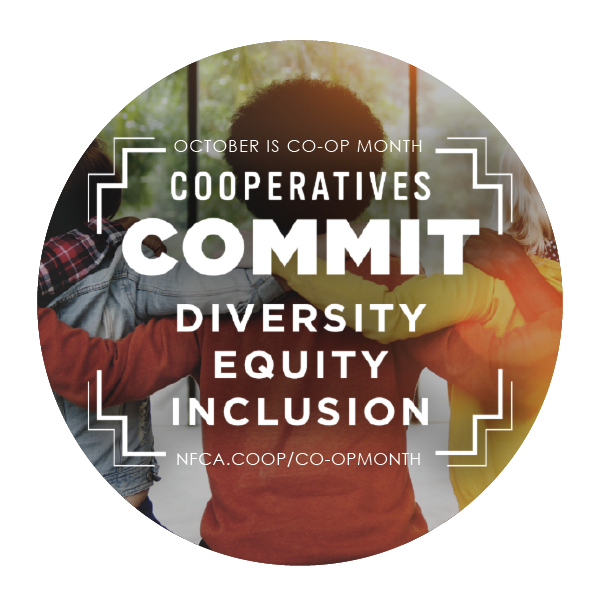 This October, your Neighboring Food Co-ops are joining co-operatives and credit unions across the United States in celebrating Co-op Month, observed nationally since 1964. This year’s theme, “Co-ops Commit: Diversity, Equity & Inclusion,” was chosen by the National Cooperative Business Association (NCBA CLUSA) to promote how co-ops and their members are working together to build more inclusive businesses and more resilient communities.
This October, your Neighboring Food Co-ops are joining co-operatives and credit unions across the United States in celebrating Co-op Month, observed nationally since 1964. This year’s theme, “Co-ops Commit: Diversity, Equity & Inclusion,” was chosen by the National Cooperative Business Association (NCBA CLUSA) to promote how co-ops and their members are working together to build more inclusive businesses and more resilient communities.
(For resources to help your co-op join in the celebration, visit our Co-op Month page.)
Across the Northeast, people have used food co-ops to improve access to healthy, local, affordable food, and build stronger, more inclusive communities. Most of these grocery stores got their start during times of social and economic change, enabling people to access healthy food, support local producers, and provide good jobs. More recently, a new wave of startups has been growing, representing renewed interest in food security, and racial and economic justice. Today, the Neighboring Food Co-op Association (NFCA) includes 40 food co-ops and startups, jointly owned by more than 150,000 members and employing over 2,350 people. Together, these co-ops generate shared annual revenue of nearly $347 million, with local products representing close to a third of total sales.
“Our vision for a more inclusive economy is one of shared prosperity and well-being, of empowering people to work together to build a better future for themselves and their families,” said Erbin Crowell, NFCA executive director and chair of the NCBA CLUSA board of directors. “And as co-operatives, we have to acknowledge that this vision cannot be achieved without also confronting the systemic racism, inequality, and injustice in our society and its institutions.”
Food co-ops are not alone in their contribution to more inclusive and resilient local communities. From farmer co-ops to worker co-ops, credit unions to mutual insurance, and housing co-ops to energy co-ops, co-operative businesses thrive across the U.S. economy, where 350 million people are co-op members. Nationwide, co-ops generate $514 billion in revenue and more than $25 billion in wages, according to NCBA CLUSA. And because they are member-owned, co-operatives are rooted in their communities and governed by the people who use them to meet their needs, rather than outside investors.
“We are part of and have been supported by a long tradition of people from all walks of life, including people of color and marginalized communities who have used cooperatives as a strategy for shared economic and civic advancement in the face of great odds and opposition,” said Doug O’Brien, president and CEO of NCBA CLUSA. “In this moment, it is our responsibility to shine a light on their legacy and ensure that we are achieving our nation’s promise of justice and equality.”
Stop in at your local food co-op during Co-op Month to learn more about what makes co-operatives different. And while you’re there, look for the “Go Co-op” signs on the shelves that identify products that were “co-op made”. You may be surprised by what you find, including dairy products from Cabot Creamery Co-op and Organic Valley, fresh produce from Deep Root Organic Co-op, fairly traded coffee from Equal Exchange and Pachamama Coffee Co-op, beverages from Katalyst Kombucha and La Riojana wines, seeds and bulbs from FEDCO, naturally fermented vegetables from Real Pickles, Northeast Grown frozen fruits and vegetables from your Neighboring Food Co-ops — and many others.
To learn more, stop in at your local food co-op or visit www.nfca.coop.

